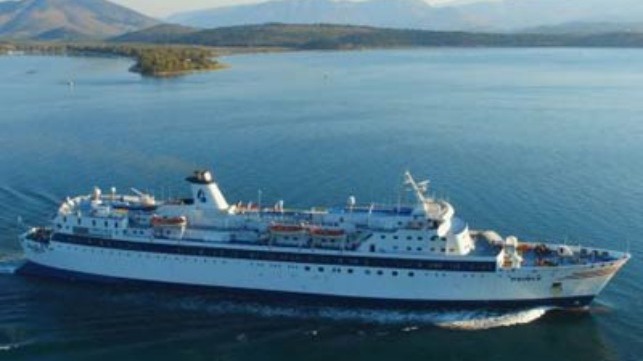NGO Calls for “Toxic” Ferry to Return to Greece for Proper Recycling

NGO Shipbreaking Platform is using the sale of a 47-year-old ro/ro ferry for scrapping in the Far East as its latest opportunity to call attention to the EU’s failure to enforce restrictions on the sale of toxic ships to the Asian scrapyards. The non-profit, which is campaigning for clean and safe ship recycling, is calling on Greece to bring the former ferry back to Europe for proper disposal and for Bangladesh authorities to reject the ship.
In addition to their effort, they also report that the sale of the ship attracted the attention of Interpol. The NGO says it understands that Interpol issued a formal alert to the Bangladesh authorities not to allow the import of the ship. Through their local representatives in Chattogram, the NGO has also filed a legal notice challenging the beaching of the vessel.
The 13,300 gross ton passenger ro/ro ferry was built in 1974 at Wartsila in Finland as the Prinsessan Birgitta, and later known as the Scandinavica and the King of Scandinavia, operating for nearly 30 years in Scandinavia. She spent her later years operating in the Mediterranean possibly with her final service being between Italy and Greece as the Prince for European Seaways. For the last three years, she was owned by a Greek company, A Ships Management, who had planned to run her on ferry service between Italy and Albania. In May 2021, the company sold the ferry for recycling.
According to the NGO, due to the age of the vessel it is likely that it contains large amounts of asbestos. In addition, they highlight the many hazardous materials typically found within the structure of ships and the operational residues after so many years of service. NGO Shipbuilding characterizes end-of-life vessels as “toxic waste.”
"According to the EU Waste Shipment Regulation, the Basel Convention, and equivalent national laws, the export of end-of-life ships laden with asbestos and other toxic materials from Greece to non-OECD countries is banned,” said Ingvild Jenssen, Executive Director and Founder of NGO Shipbreaking Platform. “We, therefore, urge Greek authorities to immediately call the vessel back for safe and environmentally sound recycling in line with Greece’s obligations under environmental legislation."
The organization highlights that the “competent authorities,” were alerted in May that the ship was being sold for scrapping. As is typical in these cases, the flag of the ship was changed twice, first from Cyprus to Togo and then to Comoros. The vessel, renamed Princess, left Greece in mid-July transiting the Suez Canal and making a brief stop in the anchorage at Jeddah, Saudi Arabia before the planned beaching in Bangladesh at the end of this month.

that matters most
Get the latest maritime news delivered to your inbox daily.
In this quarterly update, the NGO Shipbreaking Platform reported that a total of 258 were sold for scrapping in the second quarter of 2021, of which 197 ships were sold to South Asian breakers, “where conditions are known to put workers’ lives and the environment at risk.” In Bangladesh alone, in the second quarter, they said at least eight workers were injured or killed working at the yards. Further, the NGO contends that while Bangladesh mandated this year rules on the handling of hazardous materials, it lacks the capacity to measure vessels’ toxicity.
NGO Shipbreaking Platform reports that the United Arab Emirates sold the most ships to South Asian yards in the second quarter of 2021. Greece was second followed by Singaporean and South Korean owners.
